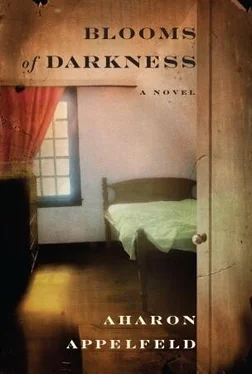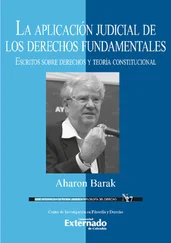Now it’s evident they have to leave, and soon. Hugo bandages Mariana’s neck with a handkerchief, and they set out. “Too bad I don’t have iodine. I had a lot of it in my room, but who ever thought I’d be wounded?” she mutters to herself.
That night they walk quite a bit. Mariana is angry at herself, because she has no idea where they are. “After all, I was born in these parts. I wandered around here during my whole childhood. What’s the matter with me?”
“We’re walking toward the mountains.” Hugo tries to comfort her.
“How do you know?”
“I feel it.” He is drawn out by her words.
“We’re groping like blind people. In every corner, there’s a pitfall or a trap. Who knows where Satan is dragging us. He’s a cheat, and he’s cunning.”
Morning breaks through and lights up the darkness. To their surprise, Mariana and Hugo find themselves standing at the foot of a mountain. On its side there are small houses surrounded by gardens. “We got there, thank God,” says Mariana, as if they had reached a different continent. She immediately sinks down onto the ground.
Hugo hurries to gather wood and light a fire. Mariana announces out loud, “From here, I’m not moving. I don’t have the strength to lift myself and walk even one more step.”
“We’ll rest. There’s no hurry.” Hugo speaks like an adult.
Then a large sun comes out and lights up the mountains and the plain. Thin mist rises from the moist earth. Not far from them a river meanders. It’s peaceful, as after a mighty battle that ended in a standoff.
Mariana puts the suitcase under her head and falls asleep. Hugo feels that he has now been freed from his bonds and can step out into the outdoors. His previous life, crammed and restricted in the closet, seems distant to him, rooted in darkness.
Mariana sleeps until noon, and when she wakes and sees Hugo at her side, guarding her sleep, she is very moved. She holds out her arms and hugs him. “I slept, and you watched over my sleep, my good soul. You didn’t sleep all last night, either.”
“Do you feel better?”
“Certainly I feel better.”
There are a few potatoes left and some sausage. They make a meal that, in her great enthusiasm, Mariana calls “a princely feast.” Fatigue and nervousness have vanished from her face, and she is entirely given over to Hugo, as though she has just discovered him.
“What are you going to want to do in the future?” She surprises him.
“To be with you,” he answers right away.
“The war is over, and soon your mother will come and get you.”
“Let’s see what happens.” He tries to give his voice the composure of an adult.
Mariana again gives free reign to her imagination. “Mariana was a beautiful, tall woman. She could have been a singer who traveled from city to city and moved people, a devoted housewife who raised her children like the Jews, going with them on long summer vacations and coming back suntanned. If I had been a kept woman, my lover would have taken me to sunbathe. But I’m a simple whore. I don’t want to conceal anything from you. To be a whore is the most contemptible thing in the world. Nothing is more contemptible.”
Hugo has learned that every one of Mariana’s moods has different words. Fortunately for him, her moods come and go, and so it is this time, too.
The sun is at its fullest, and spring is bursting from every blade of grass. Cows and horses have been taken out to graze. Mariana announces that this place is the loveliest imaginable and that it’s forbidden to waste this precious time. “All my life I was shut up in rooms,” she says again, “working at night and sleeping during the day. I forgot that there was a sky, plants, animals, and green beauty like this. Those poplars, look how tall they are. Now they’re naked, but soon they’ll be covered with silver leaves, and they’ll be even more beautiful.
“Now I’m sitting and contemplating everything. Contemplation brings tranquility to the soul. ‘Everything we see and hear is God,’ my grandma used to say, ‘because God dwells everywhere, even in the lowest weed.’ I was a child then, and I was attentive to what she said. But I went astray very quickly.”
Then she shuts her eyes and says, “The sun is warm and pleasant. I’m going to close my eyes. If informers come to arrest me, don’t follow me. Run away. You’re not to blame for my fate. You were good to me.”
Hugo wants to say, You’re wrong, it’s not true , but Mariana immediately sinks into sleep.
Hugo sits and stares at the fire and the landscape. Memories don’t disturb him. Instead, the sights of spring appear before his eyes. He imagines life from now on as pleasant — wandering along rivers with low trees on their banks, observing flowers of every hue, watching birds peck at seeds in the palm of his hand.
Mariana awakens and says, “Again you didn’t sleep?”
“I’m not tired. I was contemplating the landscape.”
“Come to me, and I’ll give you a kiss. Who knows how much time I have left to be with you in this world.”
“Always,” he responds immediately.
The following days are clear and bright. The fire burns day and night. Hugo is sure that Mariana’s fears will subside as they advance toward the wooded, uninhabited areas.
“Come on, let’s get moving,” he keeps saying.
“To where? Who knows what’s swarming around out there.”
To overcome his secret despair, Hugo fans the flames of the campfire and assures Mariana that collaborators won’t reach them there. The place isn’t populated, and it’s far from the main road.
Meanwhile, their supplies have run out, and Hugo decides to go up to one of the nearby houses to replenish them. Mariana equips him with two silver rings and is pleased by his initiative. Before he sets out, she says in a voice that he hasn’t heard before, “Please come back right away, and don’t delay.”
Fortune favors him, and for one ring he gets potatoes, a wedge of cheese, and pears. Mariana runs to him with open arms and calls him a “hero.” Hugo knows that it’s easy to change her mood. A small success restores the light to her face. She admits that depression is her enemy and knows that she mustn’t give in to it. She must always look at the bright side of life and not sink into melancholy.
Later Hugo spreads out a shirt in the water. Luckily, he catches three fish. They clean the fish and grill them on the coals. In her joy, Mariana hugs and kisses Hugo and tells him he’s in danger — she’s simply going to gobble him up.
That night she teaches him two pleasant Ukrainian folk songs, singing each one several times. They fall asleep next to the fire, intertwined. Hugo dreams about his violin teacher, a short, irritable man who used to demand relaxation and quiet from his pupils. “Relaxation and quiet are the preconditions for good violin playing,” he used to say. “For some reason,” he once told Hugo, “my parents wanted me to be a violinist. I’m irritable. Irritability doesn’t suit that instrument. Only a calm quiet brings out the required clarity and tempo.”
The next day they set out. “It’s a shame to leave this marvelous place,” Mariana says. “I’ve gotten used to this little hollow and the campfire and the tall trees that sway in the wind. Why should we wander when we can sit?” So she speaks, but in her heart she knows there’s no choice. The nights are cold, the earth is wet, and even a big fire only heats small parts of the body. They must have a roof over their heads.
They climb a hill from which the villages, the outlying areas, and parts of the city can be viewed. It turns out that they haven’t gone far. Mariana is thrilled by the landscape. “Look, dear,” she cries out, “at what God created. What beauty. What tranquility. Horses and dogs know how to live right. Only people, the crown of creation, as they say, make a commotion with everything they do. My grandma used to say, ‘Flesh and blood — today quiet and drowsy, and tomorrow a murderer.’ You have to be brave.”
Читать дальше












